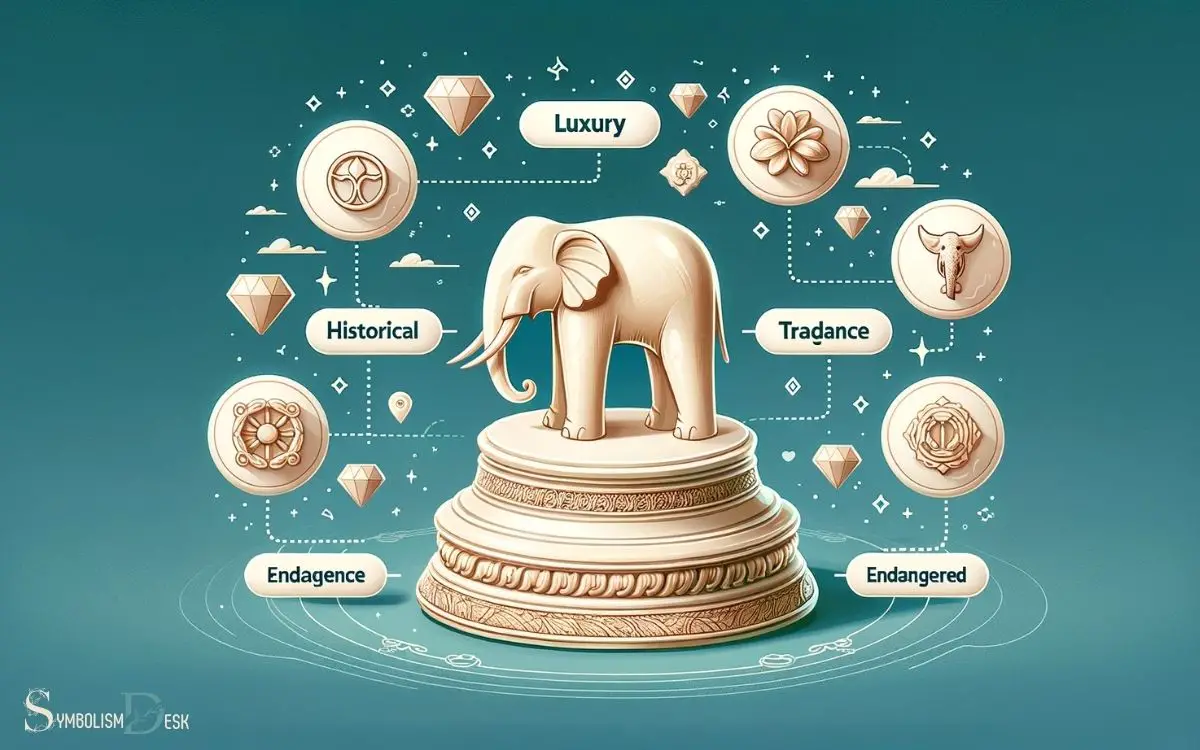What is the Symbolic Meaning of Ivory? Luxury!
Ivory symbolizes luxury, purity, and status but is also associated with the ethical implications of wildlife conservation and the plight of elephants.
The symbolic meaning of ivory is extensive, deeply rooted in history as a material revered for its beauty and rarity.
Here are some key symbolisms associated with ivory:
- Wealth and Status: Historically, only the wealthy could afford ivory, making it a status symbol.
- Purity and Innocence: The color white of ivory is often linked to purity and innocence in various cultures.
- Connection with the Spiritual Realm: Some cultures believe ivory possesses spiritual properties, connecting humans to the divine or ancestral spirits.
- Controversy and Conservation: Contemporary views on ivory are tinged with the moral and ethical issues of poaching and the endangerment of elephant populations.
Ivory’s allure is overshadowed by pressing conservation needs, urging a reevaluation of its cultural value.

Key Takeaway
7 Cultures: Symbolic Meanings of Ivory
| Culture/Tradition | Symbolic Meaning of Ivory |
|---|---|
| African | Ivory in African culture often signifies power, wealth and luxury as it is rare and expensive. |
| Asian | In Asian cultures, particularly in China and India, ivory is associated with beauty, purity, and elegance. |
| Christian | In Christian symbolism, ivory is often associated with purity, virtue and the divine. |
| Ancient Egypt | In ancient Egyptian culture, items made of ivory were associated with eternal life and strength. |
| Hindu | In Hindu belief systems, ivory is seen as a symbol of godly purity and chasteness. |
| Native American | Among various Native American tribes, ivory signifies the strength and longevity of animals like the tusks of a mammoth. It can also symbolize wealth and status. |
| Buddhist | In Buddhist traditions, ivory is often used to make religious objects, emphasizing its perceived purity and spiritual power. |
Historical Significance of Ivory
The historical significance of ivory dates back to ancient civilizations, where it was highly prized for its rarity and beauty.
- In ancient Egypt, ivory was used for intricate carvings and art pieces, symbolizing luxury and status.
- The Greeks and Romans also valued ivory for its exquisite qualities, using it for ornamental purposes and crafting religious statues.
- In Asian cultures, ivory held deep symbolic meaning, representing purity, strength, and wisdom. Its use in religious artifacts and traditional art forms signified divinity and power.
Throughout history, ivory has been a symbol of wealth and prestige, reserved for the elite and influential members of society.
Its scarcity and enduring appeal have contributed to its enduring historical significance, shaping its symbolic meaning across different cultures and time periods.
Ivory as a Symbol of Wealth
Ivory has long been associated with wealth and status, serving as a symbol of luxury and affluence in many cultures.
Its rarity and the labor-intensive process of obtaining and crafting it have contributed to its reputation as a status symbol.
Throughout history, ivory has been sought after and treasured by the wealthy elite as a display of their prosperity and social standing.
Ivory as Status Symbol
Historically, ivory has been seen as a symbol of wealth and status. In many cultures, the possession of ivory was a display of affluence and power.
Its rarity and the difficulty of obtaining it made ivory an exclusive commodity, reserved for the elite and aristocratic class.
The use of ivory in crafting luxury items such as intricate carvings, jewelry, and decorative art pieces further reinforced its association with opulence and prestige.
Throughout history, the owning of ivory objects was a way for individuals to showcase their social standing and sophistication.
Even today, although the trade of ivory is heavily regulated and frowned upon due to conservation concerns, the allure of ivory as a status symbol still persists in some circles. It symbolizes a connection to tradition, luxury, and privilege.
Ivory Representing Affluence
Representing opulence and prosperity, ivory has long been revered as a symbol of wealth and affluence across various cultures.
The use of ivory in art, jewelry, and intricate carvings has historically been reserved for the elite and affluent members of society.
Its rare and luxurious nature has made it a coveted material, often associated with power, status, and financial privilege.
Throughout history, owning ivory items has been a display of wealth and social standing, symbolizing the ability to afford such extravagant and valuable possessions.
Below is a table highlighting the association of ivory with affluence in different cultures:
| Culture | Symbolism of Ivory |
|---|---|
| Ancient Egypt | Sign of wealth and status, used in royal and elite contexts |
| Chinese | Associated with wealth, power, and high social standing |
| European | Symbol of affluence, used in luxurious art and furnishings |
This table illustrates how ivory has consistently represented affluence and prosperity across diverse cultural contexts.
Spiritual and Religious Associations
Many cultures and religions have long held ivory in high regard, associating it with divine and spiritual significance. Ivory has been used in religious ceremonies and rituals, symbolizing purity and holiness.
Its rarity and beauty have made it a sacred material, often reserved for sacred objects and symbols of worship.
Ivory in Worship
The ivory has played a significant role in religious and spiritual practices across various cultures throughout history.
In worship, ivory has been utilized for its symbolism and aesthetic qualities, serving as a material for creating sacred objects and artifacts.
The spiritual and religious associations of ivory in worship include:
- Divine Connection: Ivory has been used in religious ceremonies to symbolize a connection to the divine and the spiritual realm.
- Sacred Offerings: Ivory artifacts have been offered as gifts or sacrifices in religious rituals, symbolizing reverence and devotion.
- Symbol of Holiness: Ivory is often associated with purity and holiness, making it a fitting material for religious icons and ceremonial objects.
The use of ivory in worship reflects the deeply ingrained spiritual significance of this material in various religious traditions, emphasizing its role in enhancing the sacred experience. This reverence for ivory as a symbol of purity extends to its broader significance in religious contexts.
Sacred Symbol of Purity
Ivory symbolizes purity in various spiritual and religious contexts, embodying a sense of holiness and reverence. In many belief systems, ivory is associated with spiritual purity and is used in sacred rituals and ceremonies.
The color and smooth texture of ivory are often seen as representations of spiritual purity, and its use in religious artifacts signifies the sacredness of the objects.
In religious practices, ivory is used to create intricately carved religious icons, statues, and ceremonial objects, all of which are considered to be pure and divine.
Its symbolic association with purity makes ivory a highly valued material in religious and spiritual contexts, where it’s revered for its representation of spiritual cleanliness and holiness.
This deep spiritual significance has led to ivory being an integral part of religious traditions and practices.
This spiritual symbolism of ivory extends beyond religious artifacts and into the realm of art and craftsmanship.
Ivory in Art and Craftsmanship
Artists and craftsmen have long utilized ivory for its versatility and durability in creating intricate sculptures and ornate carvings.
The use of ivory in art and craftsmanship evokes a sense of awe and appreciation, as it showcases the incredible skill and patience required to work with such a precious material.
Ivory carvings often convey a sense of timelessness and beauty, captivating viewers with their intricate details and delicate features.
The use of ivory in art can evoke a feeling of luxury and opulence, as it has historically been associated with wealth and status.
The craftsmanship involved in working with ivory can elicit a sense of admiration and respect for the artists who dedicate themselves to mastering this challenging medium.
This artistic use of ivory seamlessly transitions into its connection to power and status.
Ivory’s Connection to Power and Status
Symbolizes wealth and influence, as it has been historically prized by rulers and elites for its rarity and luxuriousness.
Ivory’s association with power and status dates back centuries, where it was used to create intricate carvings, jewelry, and ornamental items for the ruling class.
Possession of ivory denoted affluence and authority, as it was often used in the construction of thrones, religious artifacts, and decorative objects within palaces and temples.
The material’s scarcity and the difficulty in obtaining it further elevated its value, making it a symbol of opulence and social standing.
Even today, ivory continues to be linked with prestige and influence, albeit amidst growing awareness of the ethical and environmental concerns surrounding its trade and use.
Natural World Symbolism of Ivory
The natural world symbolism of ivory is rooted in its origin as the tusks of elephants and other large mammals, connecting it to the majesty and power of these creatures in the ecosystem.
This symbolism evokes a sense of reverence and awe for the natural world, as ivory represents:
- The grace and strength of elephants and other majestic creatures.
- The interconnectedness of all living beings in the ecosystem.
- The delicate balance of nature and the importance of conservation efforts.
Understanding the natural world symbolism of ivory allows for a deeper appreciation of the significance of these animals and the role they play in the intricate web of life. It serves as a reminder of the responsibility to protect and preserve the natural world for future generations.
Is the Symbolic Meaning of Ivory and White Dove Related in Any Way?
The symbolic meaning of white dove and ivory are related in various cultures. Both represent purity, peace, and innocence. In Christian faith, the white dove is a symbol of the Holy Spirit, while ivory is associated with elegance and luxury. In different contexts, they both signify hope and tranquility.
Ethical Considerations in Ivory Symbolism
Ivory holds ethical implications that are contentious and complex, particularly concerning the conservation of endangered species.
The use of ivory in traditional cultural practices and its symbolism in art and jewelry has raised significant ethical concerns due to the detrimental impact on elephant populations.
The demand for ivory has led to widespread poaching and illegal trade, posing a severe threat to the survival of elephants and other ivory-bearing species.
Ethical considerations in ivory symbolism also extend to the cultural and historical significance of ivory, where the value of tradition conflicts with the need for species conservation.
As a result, there’s a growing global effort to address these ethical dilemmas through legislation, awareness campaigns, and sustainable alternatives, aiming to protect both the symbolic value of ivory and the welfare of endangered animals.
Conclusion
Ivory has been historically valued for its symbolism of wealth, power, and status, as well as its spiritual and natural world associations.
However, it’s important to consider the ethical implications of using ivory due to the impact on wildlife and conservation efforts.
Understanding the symbolic meaning of ivory can evoke emotions of awe and reverence, but also prompt reflection on the responsibility to protect and preserve the natural world.






